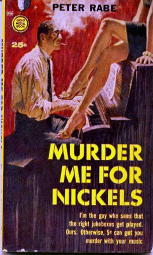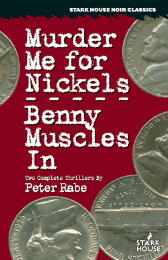Sat 16 Jun 2007
PETER RABE – Murder Me for Nickels
Gold Medal 996; paperback original. First printing: May 1960. Trade paperback, paired with Benny Muscles In: Stark House Press, 2004.
First of all, if you haven’t read it, you might want to take a look at an interview that George Tuttle did with Peter Rabe, shortly before his death in May 1990. It’s on the primary Mystery*File website, complete with cover photos and a bibliography which I compiled for the author, making it unnecessary for one to include one with this review, or at least I won’t need to if you go and come back.

When I was 16, 17 and 18, Peter Rabe was one of my favorite crime fiction authors, but it’s been several years since I’ve read this particular one, until now. It’s probably been even more than several. The usual trepidation comes into play at times like this. The question at the back of my mind is — and I imagine this happens to everyone, eventually — is he as good as I remember him?
The answer is yes, but I know I’ve just read this with different eyes and a different mind than when I read it for the first time, having just finished my first year of college in 1960 and plenty wet still behind the ears. You’ll get the present me talking about it now, not the callow youth I was back then.
My favorite detective writer back at that time was Erle Stanley Gardner, to make a small distinction between styles, and I’ll be catching up with one of his books sometime in the near future. My other favorite mystery writer, noir style, was Cornell Woolrich, who’s still the master of whatever genre of mystery fiction you may care to put him in.
Reading one of Rabe’s books, though, is like opening a case of dynamite. You do it carefully, and you hold your breath just a little. Jack Saint Louis is the primary character in this one, and the narrator. He’s the right hand man of Walter Lippit, businessman racketeer and owner of the single jukebox supplier for a 30-mile radius around town. I don’t think the town is specified, but it’s not a small town, and it’s not that far from Chicago.
Jack is tough when he needs to be, but he’s also smart when he needs to be, which is often, as he has a few things on the side, such as Walter’s girl friend Patty and a recording studio of his own. When outsiders begin crowding in on Walter, the intricate balancing act that Jack is doing becomes more and more difficult to maintain.
Told in an authentic but subdued tough guy vernacular, this is a straightforward gangster novel, not pulp fiction, but an intellectual gangster novel, but a nuts and bolts one, not a literary gangster novel such as The Godfather. Every once in a while, though, Jack’s emotions can’t be held in any longer. When he lets loose, watch out. He’s still tough and terse, don’t let me mislead you. Let’s see if quoting from page 113 will show you what I mean:
Benotti rushed me. While I stood around he made his rush. He cracked me across the side of the face and before the pain even came I felt like going to pieces. I had held back too long. I rocked across the aisle, hit a rack, and cracked open. That ball inside, is what I’m talking about. Then I was almost done and so was Benotti. My reach is better and I had the pistol.
I pistol whipped him, and I hit and hit, but not a watermelon, or a sack, but always Benotti.
He was just short of raw meat when I left him and I was done.

Rabe is a wizard at dialogue, too. One early sexy love scene between Jack and Patty goes on for six pages, for example, and over 80% of it is in dialogue, with just enough narration by Jack to, well, it’s just enough. After reading this, you will be convinced that every other paperback writer goes in for overkill.
If this is not your kind of book, I think this review will have convinced you of that. If it is your kind of book, I think this review should have convinced you of that also. What more can I tell you?
June 19th, 2007 at 1:56 am
My library actually has this. While requesting it, I also found copies of the first two Manning Coles books and Alias Uncle Hugo contained in one volume. Unfortunately, the book is on the Big Island of Hawai’i, so it may take a while to get to me.
June 29th, 2007 at 3:06 pm
Got it, read it. I like “Murder Me,” but “Benny Muscles In” left me cold. The latter is very dark indeed; it’s an excellent example of the form, but it’s a story which disturbed me (maybe that’s the intent? Dunno.).
June 29th, 2007 at 3:57 pm
Thanks for reporting back, with one of the shortest mini-reviews on record, you might say. I’ve not read Benny myself, unless I did way back when, but of course it’s on my To Be Read list. Don’t know if your comments have moved it up or down, but I’ll get to it someday, for sure!
PostScript: And do you know, I’ve just noticed something. Paragraphs two and three of the original post were the same, and no one mentioned it. I’ve fixed things up, and at least my remarks should make sense now, whether you agree with them or not. The second paragraph you see now is the new one. The third one is the one that appeared twice.
June 29th, 2007 at 5:24 pm
Mini-review indeed. Your review of “Murder” needed no additional thoughts from me. Benny is a small-time hood trying to move up the ladder in the syndicate, and he just isn’t a very sympathetic character, although he might be the most likable of a very nasty bunch.